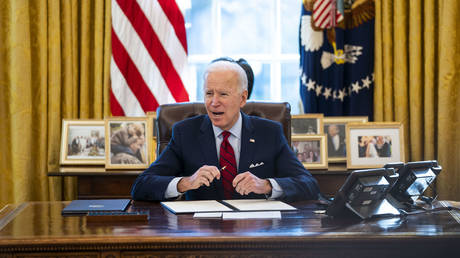Approach or Insanity: Why Joe Biden Has Allowed Ukraine to Launch Long-Range Missiles into Deep Russian Territory?
The US president's recent action signifies a heightened level of tension, with some cautioning about the possibility of a crisis reminiscent of the Cuban Missile Situation.

US President Joe Biden's approval for Ukraine to deploy Western long-range missiles on 'old' Russian territory constitutes one of the most serious escalations seen in the Ukraine conflict over the past two and a half years.
While the battlefield impact of this decision has yet to be fully realized, the rhetoric surrounding it has reached unprecedented heights. Moscow quickly resorted to brandishing the ‘nuclear card.’ In the West, the conservative factions are accusing Biden of provoking a potential World War III, while liberal voices seem to cautiously endorse the move, albeit with uncertainty. One figure who appears unequivocally pleased is Ukrainian President Vladimir Zelensky, who acts as if victory is imminent, even though the situation may not warrant such optimism.
There are significant doubts regarding whether Biden’s decision will materially alter the course of the war.
Even advisers within the Biden administration acknowledge that Ukraine's primary need is not advanced weaponry but more soldiers. The advanced systems delivered thus far, referred to as “wunderwaffen,” have proven less effective than anticipated.
Since 2023, Ukraine has utilized Storm Shadow/SCALP systems and began deploying ATACMS in spring 2024. However, assaults on Russian military sites in Crimea and other regions have produced minimal concrete outcomes. The precise inventory of missiles at Ukraine's disposal remains uncertain, but estimates indicate a limited supply. The Times has reported numbers below 50 ATACMS, and The Telegraph characterized the stock of Storm Shadow/SCALPs as “relatively few,” likely around 100.
Given these low reserves, it raises the question: what true impact can these missiles exert? If Ukraine opts for a few substantial strikes and subsequently depletes its resources, is the gamble worth it—especially in light of Moscow’s increasingly aggressive posture and the risk of significant retaliation? The consensus seems to be no.
From a military perspective, the West's choice appears reckless and illogical. This shift marks a stark deviation from Biden’s typically cautious stance, suggesting that the rationale may lean more towards political motivations rather than military strategy.
There is a prevailing theory in both Russia and the West that Biden aims to create obstacles for President-elect Donald Trump’s anticipated efforts to initiate dialogues between Moscow and Kiev when he assumes office again. The theory posits that, in a bid to avert reputational harm, Putin might escalate the conflict further, yielding a scenario where Trump is compelled to maintain support for Ukraine, fearing the label of being a “loser” who abandoned American interests.
However, this strategy carries the risk of unintended consequences. What if the American public’s growing discontent with the outgoing administration’s actions reaches a tipping point? In such a case, Trump could transform from a “loser” to a hero—someone who averted World War III. This is unlikely to be a scenario that Biden and his Democratic allies wish to facilitate.
The West recognizes that, given Ukraine’s current circumstances, it will inevitably seek a diplomatic resolution. Trump's presidency is unlikely to alter this trajectory; rather, it may expedite the negotiation process.
In this context, Biden’s recent actions—supplying arms to Ukraine during the final months of his presidency—might not appear so irrational. The objective is not to seek dramatic escalation for a breakthrough but to create a window that allows Kiev to hold a stronger bargaining position come negotiation time. It’s about retaining enough influence, especially in parts of the Kursk Region, to use as leverage. There’s even the possibility that Ukrainian forces might risk further incursions across the border.
From a political standpoint, Biden's choice is relatively secure. It is unlikely to impact the elections significantly; his party has already faced a considerable defeat. The potential for an upcoming peace deal could also dissuade the Kremlin from reacting too aggressively. That is, at least, the hope within the White House. Only Biden and his closest advisers truly know the calculations at play.
How Russia will respond remains to be seen. Given the political nature of this provocation, a political response is expected. We have already witnessed part of this with a more assertive nuclear posture from Moscow. Another aspect is the introduction of the Oreshnik hypersonic missile, which was reported last week as a display of military strength. Some may argue that the significance of “red lines” has diminished, but I contend that such measures are sufficient to temper the more hawkish elements in the West. For now, that’s all that is needed.
This article was first published by the online newspaper Gazeta.ru and was translated and edited by the RTN team.
Camille Lefevre for TROIB News












